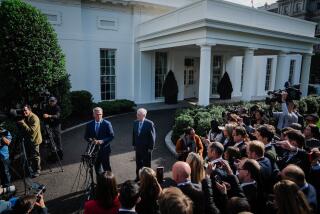Bumps on the Road to European Utopia
- Share via
No sooner had the British prime minister salvaged his conservative government by forcing a showdown vote in Parliament over the European unity treaty than Europe’s monetary system started to unravel. The moral to the story is that sometimes economics is an even more powerful force than politics.
The forces opposing the Maastricht Treaty on European Union have been formidable. Various nations struggled through the approval process: Denmark required two referendums before voters OKd the treaty; Germany is still trying to overcome a legal challenge in its courts.
But perhaps opposition to Maastricht was nowhere more colorful than in Britain, where elements of the governing Conservative Party pushed Prime Minister John Major to the wall. Feelings in the right of his party ran so high that it was far from certain that the right-wingers would stay loyal and vote as Conservatives when Major staked his government’s survival on parliamentary ratification. In the end Major prevailed, though barely.
The British prime minister is right on this issue. In an age of economic interdependence and global telecommunications, hoary political and economic barriers to cooperation in commerce and finance must be lowered. That is the point of European unity. Major prefers to move his nation toward integration and modernization in a progressive manner, even though Britain unhitched the pound from the European monetary system last September.
But last Monday the prospect of economic unity any time soon did not seem very good. The European monetary system came unglued. This system--the centerpiece of the Maastricht Treaty--was designed to cement together all the currencies of the European Community’s 12 members. The system was viewed as a precursor to the ideal of a single European currency. However, one currency in the system--Germany’s--was so strong that it was suffocating all the others. Early last week frustrated European financial officials moved to allow each currency to achieve a measure of independence from the deutschemark.
That move was inevitable to protect the French franc and other currencies. Germany’s central bank could not be deflected from its historical obsession with keeping inflation under control--an obsession heightened by the inflationary consequences of the 1990 unification with East Germany. It was thus a matter of economic self-interest for the other parties to the treaty to loosen the international controls over the value of their currencies.
Economic self-interest will usually take precedence over political vision. That’s why European economic unity remains a long way off.
More to Read
Sign up for Essential California
The most important California stories and recommendations in your inbox every morning.
You may occasionally receive promotional content from the Los Angeles Times.











